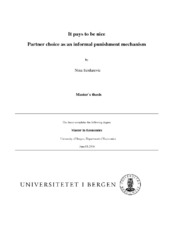It pays to be nice: Partner choice as an informal punishment mechanism
Master thesis
Permanent lenke
https://hdl.handle.net/1956/12309Utgivelsesdato
2016-06-01Metadata
Vis full innførselSamlinger
- Department of Economics [301]
Sammendrag
Two mechanisms that have been shown to facilitate cooperation are partner choice and punishment, but can partner choice be employed as an informal punishment mechanism? To examine this question I conduct two experiments. The first experiment studies a two-person repeated Prisoner`s Dilemma game. Each individual is allowed to choose one person from a fixed group of five subjects they wish to be paired with. The individual who fails to find a partner is excluded from the group. Moreover, and most importantly, I elicit individual cooperative dispositions prior to the two-person repeated Prisoner`s Dilemma game and examine how different types of individuals perform when allowed to choose a partner. Results show that partner choice does not increase the overall efficiency. However, there appear to be interesting differences in the performance of individuals who exhibit heterogeneous cooperative dispositions. Cooperative individuals outperform non-cooperators when allowed to choose a partner. The second experiment is conducted in the Norwegian Citizen panel and attempts to distinguish between the social and the monetary cost associated with exclusion. I study a one-shot continuous Prisoner`s Dilemma game where exclusion is the consequence of being the lowest contributor in a group of three individuals. The monetary outside option is varied to examine which cost of exclusion individuals value the most. The results of the survey experiment show that the social cost of exclusion increases cooperation significantly, regardless of the size of the monetary cost linked to exclusion. The lab experiment is computerized with the experimental program z-Tree 3.3.8 (Fischbacher, 2007). Results of both experiments are analysed with the statistical software STATA/IC 14.1 and Microsoft Excel 2016.
